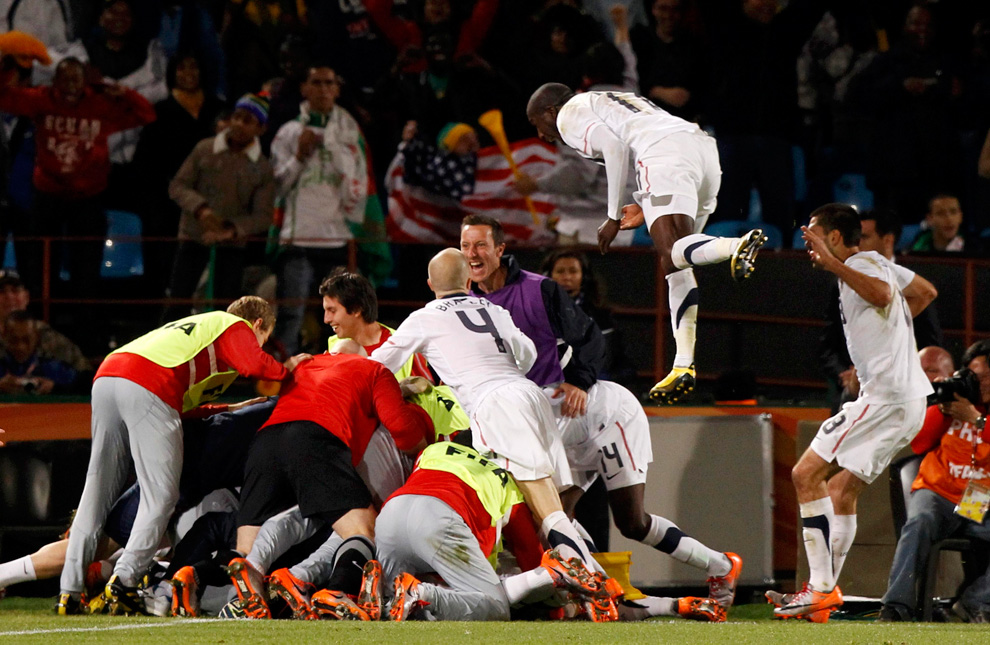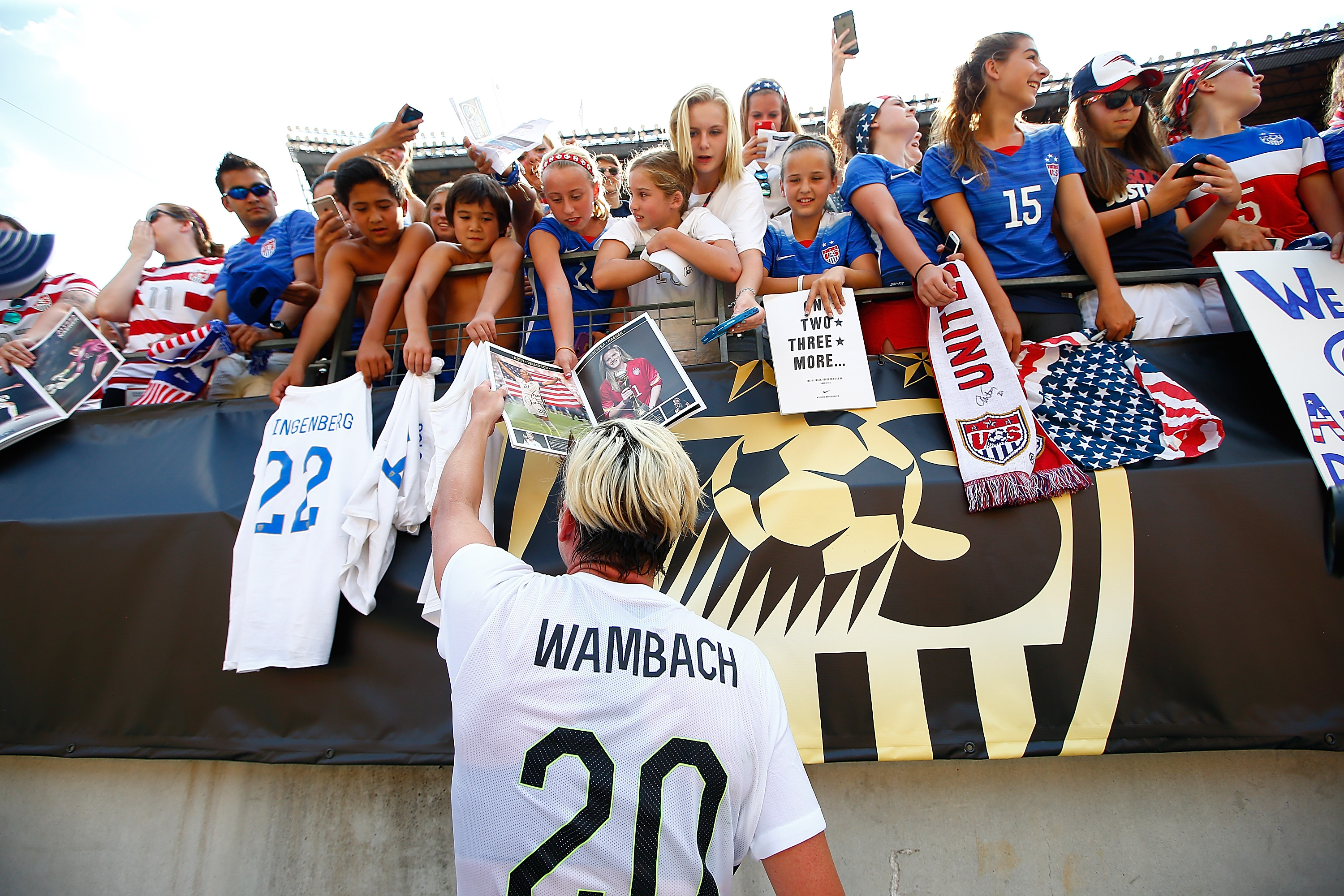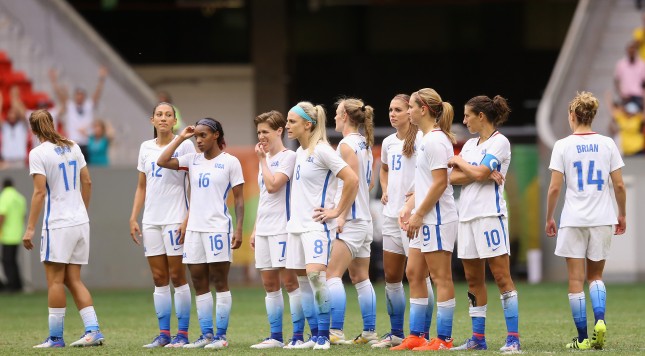Now that it’s been an entire weekend since the USWNT were eliminated by Sweden in the Rio Olympics Quarterfinal, it’s finally a time to have a rational look at the team to determine why they lost and where they go from here and if we learned some things on the way. While it seemed like everybody else was falling all over themselves to have the hottest of hot takes in the minutes and the days after they lost, none looked at the actual issues and what the USWNT need to do in order to be at their best in 2019.
Looking at the USA vs. Sweden match itself, there were multiple factors that caused the result to favor Sweden. Some were things that all teams face but others were unique to the National Team itself. The tournament format makes it tough on anybody to play and win. Every team had to play three group stage matches with just an 18-woman roster in the span of six days. Add that the USWNT played their final group stage match in the rain forest of Manaus, it’s something that can take a toll on any team.
But the big reason for the USWNT to lose to Sweden was coach Jill Ellis. I firmly believe Ellis has done a wonderful job in keeping the team to the exceptional standard they have come to expect. She isn’t afraid to try new concepts and bring in new players in order to look to the future, all while trying to remain the best women’s soccer team in the world. That being said, Ellis outcoached herself during the Sweden match. The USA waited way too long to switch from a playing style that consisted of running down the pitch and cross into the box to passing more on the ground, centrally on the pitch. I’m seeing 5’1″ Crystal Dunn trying to win a header in the box against a Swedish defender who is at least eight inches taller than her, of course that gameplan wasn’t going to work. But they kept trying to do that for the first 70 minutes. Megan Rapinoe is one of the greatest crossers in the sport but there’s only so much you can do in that situation.
And speaking of Rapinoe, Ellis handled Rapinoe’s playing time completely wrong. Ellis played Rapinoe for the first 30 or so minutes against Colombia, knowing she wasn’t going to be playing any more than that. So you used up a substitute within 30 minutes, while behind 1-0, in Manaus. Maybe it was a test for Rapinoe for the knockout round since the USWNT already qualified and had nothing to lose, but despite that, Rapinoe was brought on and then taken off for the Sweden match. Despite getting an extra substitute in extra time, Ellis used up her sub for someone who could only play a half hour. I get that Megan Rapinoe is one of the best players on the squad but that really wasn’t the right move when players are tired after 120 minutes. Jill Ellis outcoached herself but she wasn’t the first coach to do this and she won’t be the last. And Ellis has shown that she can use the Sweden game to realize that and learn for the future.
Also, let’s not take anything away from Sweden. They played well and earned the win, despite Hope Solo’s comments. Sweden and former USWNT manager Pia Sundhage knew the exact way to win. Stay compact defensively and counterattack. Sweden knew they weren’t going to go toe-to-toe with the United States but “park the bus” and strike when the opportunity strikes, that’s how you can win. It’s not a new concept, it happens in every league and tournament. If Sweden was able to do that so easily, it’s up to the United States to figure out something different and counteract that. That’s the point of soccer. It’s not about whether or not the best team wins, it’s the team with the most points at the end of the match.
Looking forward, there will probably be a few changes made to the squad in between now and 2019. And with players like Amy Rodriguez, Sydney Leroux, Samantha Mewis, Emily Sonnett and Ashlyn Harris all on the outside looking in for one reason or another at the Olympics, this team could look a bit different in three years.
The big dilemma will be the status of Hope Solo. Solo is 35 now and in three years, will be 38 by the time the Women’s World Cup comes around. It is indisputable that Hope Solo is one of the best goalkeepers in soccer and to say anything different would diminish what she has done on the pitch. Despite that, Jill Ellis may need to look forward and for the greater good of the National Team to look to either Alyssa Naeher or Ashlyn Harris, use the three years in between to build them up and make them prepared for the World Cup in France.
This happened to Solo’s predecessor. Briana Scurry was regarded as one of the best goalkeepers ever and was benched, as a 35-year-old, in the 2007 Women’s World Cup in favor of Solo, winning the third place game. Solo would be the first choice goalkeeper since and Scurry all but retired from international play. The move got a lot of criticism and didn’t seem like the right move but that’s the circle of life for a goalkeeper. Only one person can be a goalkeeper and except for injury, are able to play every match. Benching Scurry for Solo was the best move for the future of the team, just like nine years later, it’s time for Naeher or Harris to replace Solo and look forward to 2019, 2020 and beyond.
So after looking at why the USWNT lost and what changes they may or should be making, did we actually learn anything from the Rio Olympics? I think we all learned some uncomfortable truths that for better or worse, changed how we interpret the USWNT. One, this Olympics showed that no matter how great the United States is at women’s soccer, the USWNT can be beaten on any given day. I’m sure the players knew that but I don’t believe many fans did. Or if they did, they didn’t really believe it. I even wrote a piece before the tournament asking if anyone could beat the United States. We talked about how anything less than a gold medal was a failure. Worst case scenario, the USWNT would get silver or bronze. Nobody thought that the USA wouldn’t even get out of the Quarterfinals, even though women’s soccer gets more and more competitive as more and more countries devote more resources into the women’s side of the sport.
And that leads into something that the USWNT have to face as time goes on. When the Women’s World Cup started in 1991, there were a handful of teams who could actually compete. Not trying to belittle what those teams did in the 90’s but the gap between the have’s and the have not’s was miles apart than what it is today. Last year in the Women’s World Cup, you had about six teams, including the United States, with a legitimate shot at the World Cup title. This year, any of the four teams in the Semifinals can now win the gold. The quality has rapidly improved and it is improving in other places, catching up to the skill of the USWNT. Yeah, that makes it a bit tougher for the National Team to win, and it’s not to say the USWNT will revert to the kind of level that the National Team is right now but like last year’s World Cup, made them a better team who won. Thus it’s great for women’s soccer as a whole.
Also, last but not least, we learned one big uncomfortable truth that changes the perspective of the USWNT. The USWNT is not well liked in other parts of the world. It’s easy to pin all this on Hope Solo. Her zika posts on social media struck a nerve with the Brazilians that it caused them to chant “zika” when she touched the ball. Or Solo’s comments when the USWNT lost to Sweden when she branded the Swedish National Team as “cowards.”
But it’s much more than that. The USWNT is hated around the world the same way teams like the New York Yankees, Dallas Cowboys and Manchester United have a sizable amount of haters for their teams, because they win. Now, these three teams haven’t won as much as they used to but at their height of dominance, their fans loved it and couldn’t get enough. Fans of other teams or neutrals hated it. Call it envy, jealousy or boredom from seeing the same team win over and over again, sparks a kind of hatred on that team. If you are a fan of a great women’s soccer team like Brazil, England, France, Australia, Sweden and Canada, are you really going to like the USWNT and the fact they win all the time? I’m sure when Japan defeated the United States and won the 2011 Women’s World Cup, more than just Japan and their fans celebrated the win just like when Sweden beat the United States. And that’s okay. Sometimes success brings haters and if people hate you because you’re winning, it means you’re doing something right.
The loss to Sweden surely wasn’t pleasing for the USWNT and their fans but it certainly wasn’t a “death blow” to the squad or women’s soccer in the United States like some tried to make it out to be. It sucks, and I’m sure if given the choice, the players would love to have gold but it’s not the reality. In the end, the USWNT and women’s soccer fans in the United States will move on from the Rio Olympics and will remain a favorite for future success. And given how they were eliminated this year, the National Team will have a little extra motivation when qualifying starts for the 2019 Women’s World Cup a little less than three years from now.






